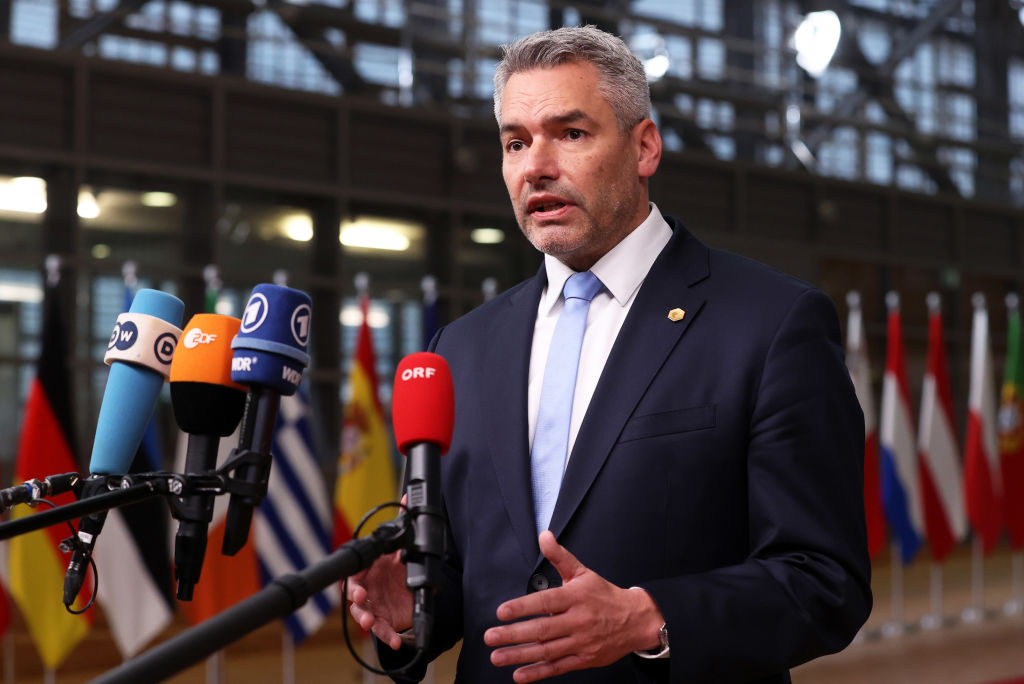Austrian chancellor meeting with Putin to share 'the reality' of the war


A free daily email with the biggest news stories of the day – and the best features from TheWeek.com
You are now subscribed
Your newsletter sign-up was successful
Austrian Chancellor Karl Nehammer will visit with Russian President Vladimir Putin on Monday in a face-to-face meeting Austria has positioned as an opportunity to send Putin "a very clear political message," and tell him "the truth" about the war in Ukraine, The Washington Post reports.
The sit-down will be Putin's first with a Western leader since the Kremlin officially mounted its invasion back in February, per the Post.
"It makes a difference to be face to face and tell him what the reality is: that this president has de facto lost the war morally," said Austrian Foreign Minister Alexander Schallenberg.
The Week
Escape your echo chamber. Get the facts behind the news, plus analysis from multiple perspectives.

Sign up for The Week's Free Newsletters
From our morning news briefing to a weekly Good News Newsletter, get the best of The Week delivered directly to your inbox.
From our morning news briefing to a weekly Good News Newsletter, get the best of The Week delivered directly to your inbox.
"It should be in his own interest that someone tells him the truth," Schallenberg continued, per Reuters. "I think it is important and we owe it to ourselves if we want to save human lives."
Volodymyr Zelensky is aware of the trip, said Nehammer, who met with the Ukrainian President on Saturday. European Union leaders Ursula von der Leyen and Charles Michael, German Chancellor Olaf Scholz, and Turkish President Recep Tayyip Erdoğan have also been informed of the sit-down, per The Guardian.
Austria is calling for "humanitarian corridors, a ceasefire, and the full investigation of war crimes," The Guardian writes. The country is not a part of NATO.
The meeting arrives as Zelensky has warned Russia plans to shift its operations to eastern Ukraine, The Guardian notes. Last week, much of the international focus was on the carnage out of the Kyiv suburb of Bucha, discovered once Ukrainian forces retook the area. The bloodshed raised allegations of Russian war crimes.
A free daily email with the biggest news stories of the day – and the best features from TheWeek.com
Brigid Kennedy worked at The Week from 2021 to 2023 as a staff writer, junior editor and then story editor, with an interest in U.S. politics, the economy and the music industry.
-
 How the FCC’s ‘equal time’ rule works
How the FCC’s ‘equal time’ rule worksIn the Spotlight The law is at the heart of the Colbert-CBS conflict
-
 What is the endgame in the DHS shutdown?
What is the endgame in the DHS shutdown?Today’s Big Question Democrats want to rein in ICE’s immigration crackdown
-
 ‘Poor time management isn’t just an inconvenience’
‘Poor time management isn’t just an inconvenience’Instant Opinion Opinion, comment and editorials of the day
-
 What is ‘Arctic Sentry’ and will it deter Russia and China?
What is ‘Arctic Sentry’ and will it deter Russia and China?Today’s Big Question Nato considers joint operation and intelligence sharing in Arctic region, in face of Trump’s threats to seize Greenland for ‘protection’
-
 New START: the final US-Russia nuclear treaty about to expire
New START: the final US-Russia nuclear treaty about to expireThe Explainer The last agreement between Washington and Moscow expires within weeks
-
 What would a UK deployment to Ukraine look like?
What would a UK deployment to Ukraine look like?Today's Big Question Security agreement commits British and French forces in event of ceasefire
-
 Did Trump just end the US-Europe alliance?
Did Trump just end the US-Europe alliance?Today's Big Question New US national security policy drops ‘grenade’ on Europe and should serve as ‘the mother of all wake-up calls’
-
 Is conscription the answer to Europe’s security woes?
Is conscription the answer to Europe’s security woes?Today's Big Question How best to boost troop numbers to deal with Russian threat is ‘prompting fierce and soul-searching debates’
-
 Trump peace deal: an offer Zelenskyy can’t refuse?
Trump peace deal: an offer Zelenskyy can’t refuse?Today’s Big Question ‘Unpalatable’ US plan may strengthen embattled Ukrainian president at home
-
 Vladimir Putin’s ‘nuclear tsunami’ missile
Vladimir Putin’s ‘nuclear tsunami’ missileThe Explainer Russian president has boasted that there is no way to intercept the new weapon
-
 The Baltic ‘bog belt’ plan to protect Europe from Russia
The Baltic ‘bog belt’ plan to protect Europe from RussiaUnder the Radar Reviving lost wetland on Nato’s eastern flank would fuse ‘two European priorities that increasingly compete for attention and funding: defence and climate’
